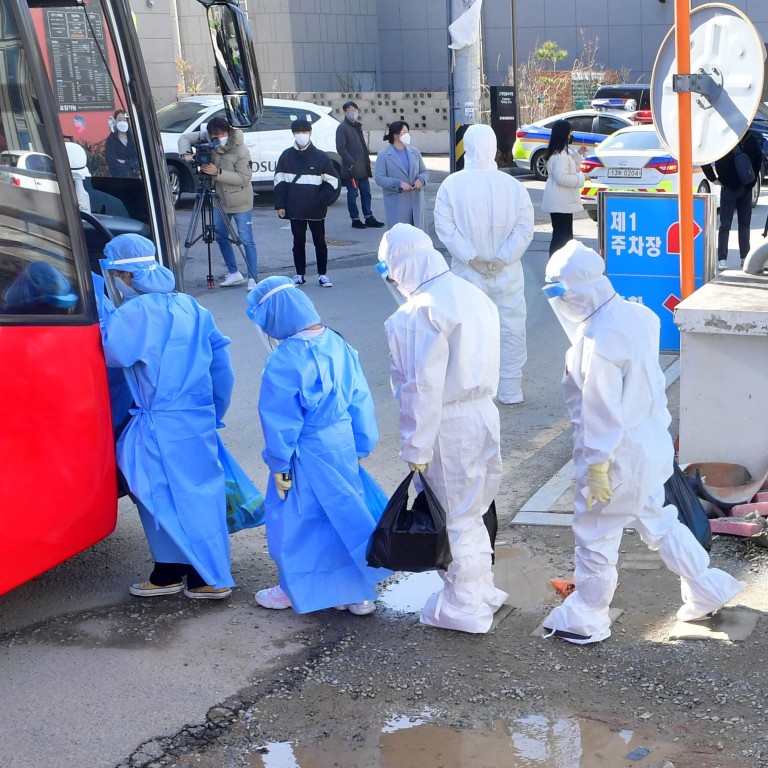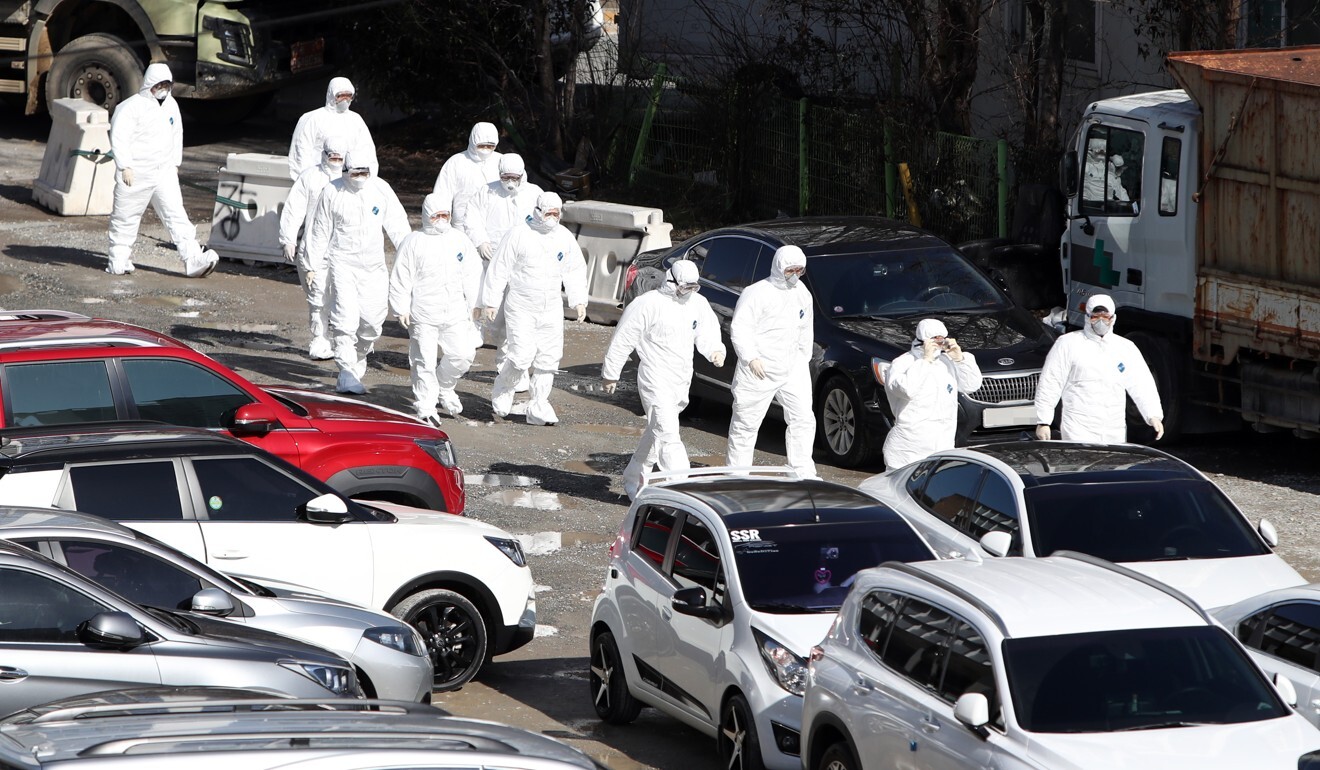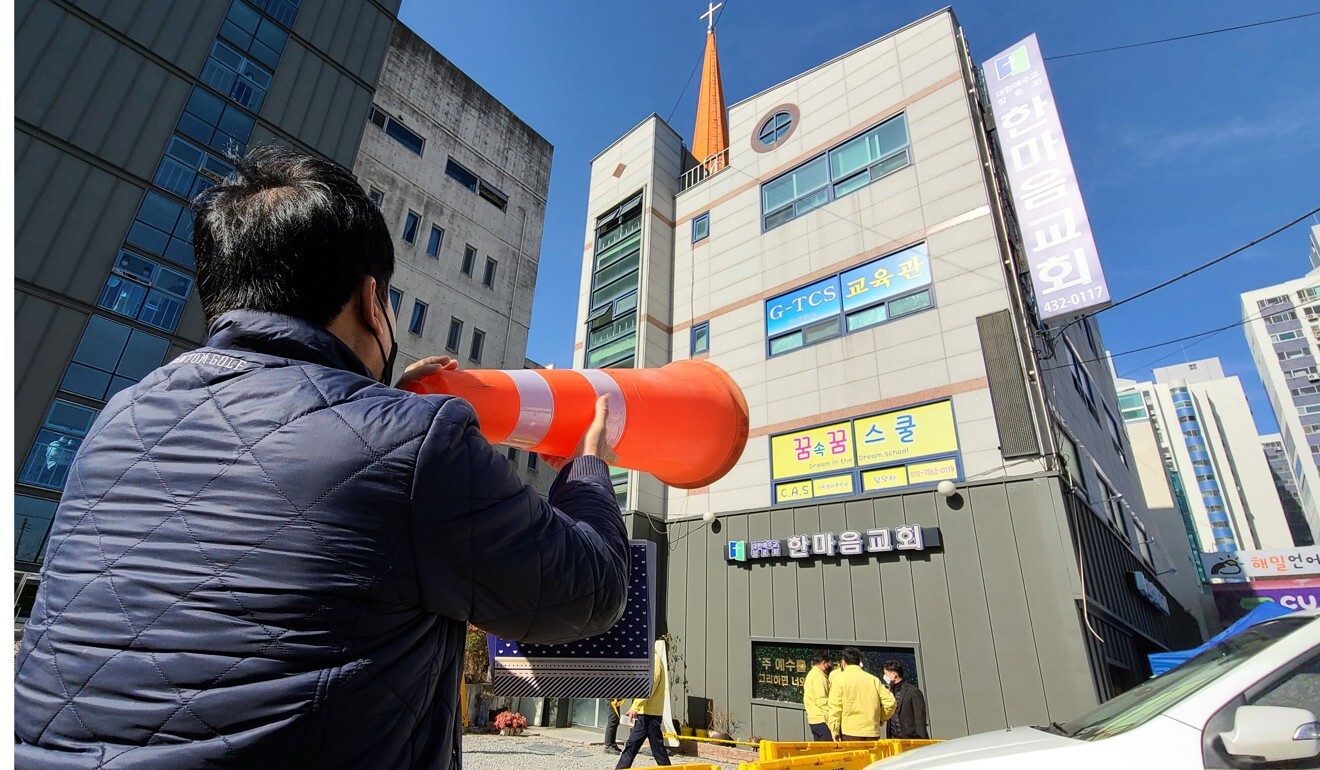
Coronavirus hotspots: anger in South Korea as fringe church schools drop masks, put faith in God
- One unauthorised Christian school in Gwangju was the source of over 100 new Covid-19 infections, with protesters pelting its building with eggs
- Fringe Protestant groups have been linked to major outbreaks, including the controversial Shincheonji church in February last year
Wearing thick winter coats and sitting close together on the floor, about 20 children without face masks sway back and forth, chanting prayers at the top of their voices. Elsewhere, maskless teenagers dance, jumping up and down and clapping their hands.
“Yes, this [surveillance camera footage] was from the dorm last month. It was our fault for failing to wear masks,” a school manager told JTBC TV news.
South Korea’s Christians losing faith amid outbreaks linked to churches, pastors say
The school is one of over 30 unauthorised boarding schools operated by English teacher-turned evangelist Michael Cho, which mix religious instruction with preparation to study abroad.
More than 320 people have tested positive at its three facilities in Gwangju and two others in the central city of Daejeon operated by Cho’s International Mission (IM), to which many cases in Seoul and other provincial cities including Anseong, Hongcheon and Anyang have also been traced.
“We will conduct sweeping inspections at such unauthorised facilities in order to stop quarantine loopholes and prevent the spread of the virus to the local community,” Gwangju mayor Lee Yong-sup told local media.
Health authorities have stressed the importance of social distancing and wearing masks while also cautioning about churches.
“The virus tends to spread fast and wide when people repeatedly engage in religious activities, gathering in closed rooms and chanting together and saying prayers loud,” senior health official Sohn Young-rae told journalists.

Then came the second wave last summer, centred on Sarang Jeil Church led by a maverick pastor, Jeon Kwang-hoon. At least 800 cases were traced to this church in Seoul.
Jeon is fiercely opposed to President Moon Jae-in, calling him a communist and accusing him of planting what he called the “Wuhan virus” among his followers in retaliation for his dissent.
South Korean sect leader cleared of blocking Covid-19 prevention effort
When the third wave hit the country late last year, at least 600 cases were traced to an evangelical group known as BTJ (Back to Jerusalem) Mission.
Its founder, Choi Paul, has spread conspiracy theories that the coronavirus pandemic is a cover to implant traceable microchips and that the Microsoft co-founder Bill Gates is behind it. “What will happen if you get vaccinated? You all will be their slaves,” he said in a sermon.
Koreans are quite emotional and they tend to be easily swayed by emotional appeals employed by crooks in religious disguise
IM leader Cho has also ridiculed science and the country’s social distancing regulations.
“During this [summer] vacation, I dealt with 2,000 children through training sessions amid the pandemic … but none of them has caught the virus … I think God protects us scientifically,” he said in a sermon.
After the outbreak at his schools, however, he issued a public apology. “Lowering my head, I deeply apologise … for failing to deal with it properly, thinking that it might be a common flu … There is no excuse for that,” he said on Tuesday.

Angry citizens in Gwangju were not convinced and staged a protest outside TCS International School on Wednesday, pelting its front wall with eggs until riot police stopped them.
“How can religious groups ignore regulations while restaurants suffer to abide by them,” a restaurant owner who egged the school told a local TV news programme.
“I had to turn back … customers who came in groups of more than four people, apologising to them thousands of times. I also put tables sparsely in line with distancing [regulations]. Our suffering is beyond description,” he said.
“And look at what churches are doing. Whenever things appeared to start calming down, churches produced cases massively. I just hope the government deals with them sternly for once so that the situation returns to normal at an early date.”
After South Korea’s early coronavirus success, latest wave hits hard
His views were echoed by internet users who expressed anger at the way fringe religious groups have insisted on person-to-person prayer sessions in contravention of social distancing requirements, while also refusing to cooperate with health authorities.
“Religious facilities must all be closed down during this pandemic. People have had enough. Damage from religious meetings has gone well beyond limits. All are suffering because of you [churches]. I just plead with you to listen to health authorities,” one commenter wrote on a news portal.
“Korean protestant churches have long forgot about their religious duty and they have degenerated into interest groups obsessed with making money,” another wrote, gathering more than 17,000 “likes”.
Park Hyun-tack, president of the Korean Christian Heresy Research Institute, said there are hundreds of unauthorised religious schools like Cho’s across the county which have failed to draw attention from health authorities.
“Most of them are operated by small churches which are greatly interested in tuition fees and other incomes from such schools,” he told This Week in Asia, adding that these churches also want to turn their pupils into followers when they grow up.
“It is true that there is a disproportionately large number of fringe churches embracing heretical thoughts in this country,” with many church leaders claiming to either be the second coming of Jesus Christ or God himself, he said.
Is a push to leave Seoul gaining ground among South Koreans?
While South Korea’s large Protestant churches are under pressure for focusing on expanding their congregations and amassing wealth, fringe churches promoting not only heavenly blessings but instant earthly happiness have sprouted over the last few decades, Park said.
“Koreans are quite emotional and they tend to be easily swayed by emotional appeals employed by crooks in religious disguise,” he added.

